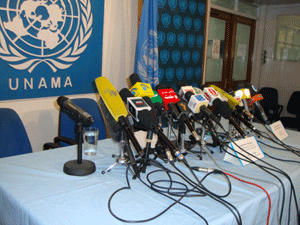KABUL - Afghanistan registered significant progress in defending rights of journalists and promoting freedom of the press in 2012, an achievement hailed by both journalists and the Government of Afghanistan.
In its World Press Freedom Index 2013 released on 30 January, the Reporters Without Borders (RSF), a Paris-based media rights watchdog, ranked Afghanistan 128th in its global index of 179 countries.
Click here for the World Press Freedom Index 2013
The latest ranking is 22 places up from 150 in 2011 and 147 in 2010. This is the second best RSF ranking of the country since 2002 (104), a year after the Taliban regime collapsed.
The RSF linked the progress to no journalist being in the prison, while cautioning that challenges lie ahead. “It is nonetheless facing many challenges, especially with the withdrawal of foreign troops,” the group said. “No journalists were killed in 2012 and arrests of media workers declined.”
Hailing the achievement, Afghanistan’s Deputy Minister for Information and Culture, Din Mohammad Mobariz Rashidi, said his Ministry would ensure “all possible support” to the media and journalists in the country. “Our law on freedom of media is one of the best in the region,” he declared, while talking to UNAMA.
Mr. Rashidi also claimed that his Ministry had been standing up to any pressure to journalists “from political corners”. “That is the reason why our ranking has improved,” he explained.
Article 34 of the Afghan Constitution has guaranteed the freedom of expression by saying this is “inviolable”.
However, while acknowledging positive developments in Afghanistan’s media sector, Akhpalwak Safi, the country’s one of the media figures, said a lot needs to done. “Generally, the situation has improved as the authorities are learning to deal with the media. There may not be journalists behind the bar now, but this doesn’t mean we don’t have problems,” said Mr. Safi, the Executive Director of the National Association of Journalists.
Mr. Safi also pointed out the fact that the Afghan media have been losing financial resources, leaving about 500 journalists (of about 10,000 countrywide) jobless in 2012 alone. “Thousands more (journalists) are likely to lose their jobs by 2014,” he painted a gloomy picture.
He also cited pressure from “warlords, pressure from Government officials in the provinces, insurgency and mafia” as factors contributing to stifling media freedom in Afghanistan. The single biggest challenge for Afghan journalists in the coming months, said Mr. Safi, is security.
This year’s RSF index based solely on events between the start of December 2011 and the end of November 2012.
Despite the “considerably better rating” than in previous years, the 2013 Index also noted that violence against journalists did not disappear completely and “the Government neglected to tackle the issue of impunity”.
“The withdrawal of some foreign troops from the international coalition and deteriorating conditions in neighbouring Pakistan meant these improvements (in Afghanistan) were precarious.”
The same three European countries – Finland, the Netherlands and Norway – that headed the index last year hold the top three positions again this year. The five worst performing countries in the index are Eritrea, North Korea, Syria, Somalia and Iran.
“The high number of journalists and netizens killed in the course of their work in 2012 (the deadliest year ever registered by Reporters Without Borders in its annual roundup), naturally had an a significant impact on the ranking of the countries where these murders took place, above all Somalia (175th, -11), Syria (176th, 0), Mexico (153rd, -4) and Pakistan (159th, -8).”
By UNAMA Kabul
Related Articles:
1. Afghan journalists form umbrella body to ensure press freedom and defend their rights
2. KUNAR: The province’s first private TV station begins transmission
3. Story of Afghan family forced by poverty and neglect to live in a cave wins UNAMA radio prize
4. UNAMA training to enhance capacity of Afghanistan’s radio journalists
5. Afghan journalists miffed by Government orders to 'control' media coverage
6. SOCIAL MEDIA WEEK: Afghanistan’s urban youth embrace social media
7. Journalist community demands 19 amendments in existing Afghan Media Law






